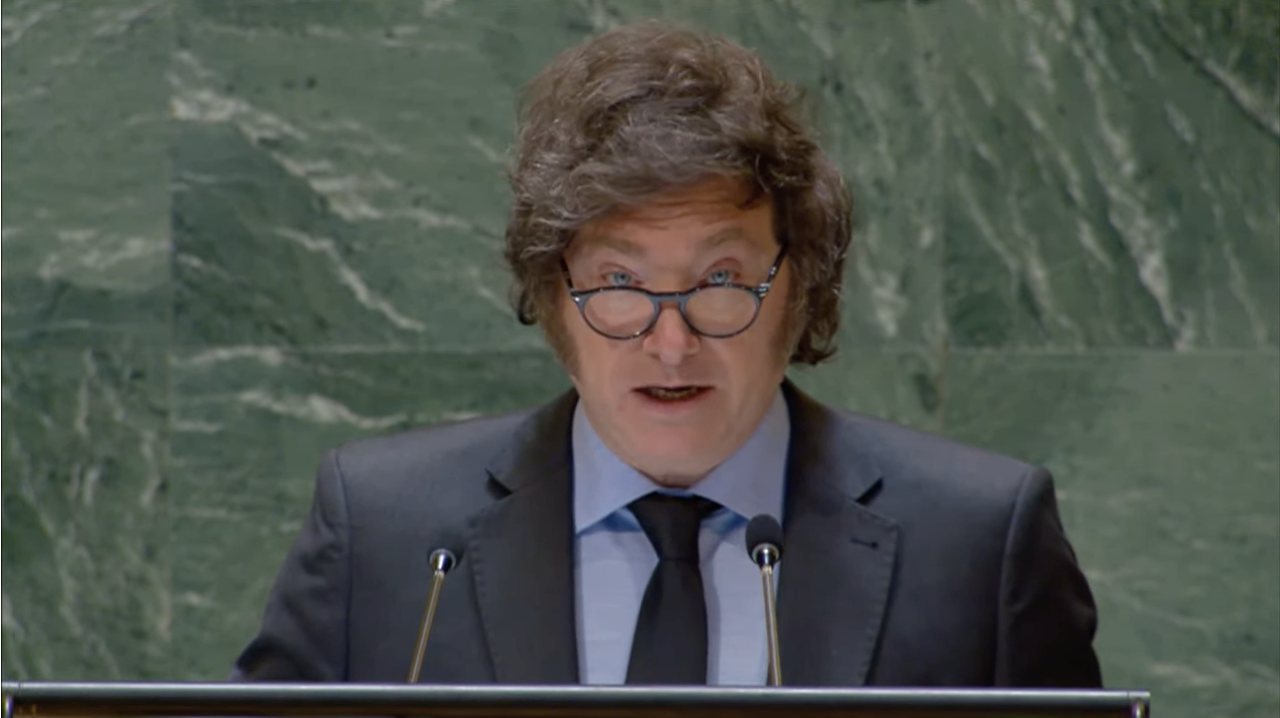from Your News:
 Argentine President Javier Milei delivered a scathing speech at the U.N. General Assembly, condemning globalism, Covid-19 lockdowns, and the World Economic Forum.
Argentine President Javier Milei delivered a scathing speech at the U.N. General Assembly, condemning globalism, Covid-19 lockdowns, and the World Economic Forum.
By yourNEWS Media Newsroom
Argentine President Javier Milei made headlines during his debut at the United Nations General Assembly on Tuesday, where he criticized globalism, denounced the U.N.’s Agenda 2030, and called out Covid-19 lockdowns as a “crime against humanity.” In his impassioned address, Milei, who took office in December 2023, challenged the prevailing narratives of global organizations like the U.N. and the World Economic Forum (WEF), warning that their policies are steering the world into an uncertain and perilous future.
TRUTH LIVES on at https://sgtreport.tv/
Introducing himself as a “libertarian economist,” Milei expressed his discontent with the “moral posturing” of international institutions. He pointed out the failure of over a century of collectivist policies in Argentina, which led to his election as president. Speaking to an audience familiar with speeches advocating climate change initiatives and wealth redistribution, Milei stood apart, critiquing these mainstream U.N. priorities.
Milei initially acknowledged the U.N.’s historical role in preventing large-scale conflict, noting that its establishment post-World War II had succeeded in averting another global war. He cited the 70 years of relative peace as one of the U.N.’s significant achievements, referencing the biblical prophecy from the Book of Isaiah: “And they shall beat their swords into plowshares, and their spears into pruninghooks: nation shall not lift up sword against nation, neither shall they learn war anymore.”
However, the Argentine leader quickly shifted gears, accusing the U.N. of straying from its original purpose and morphing into a “supranational government” that imposes a rigid way of life on citizens worldwide. He accused the organization of becoming a “leviathan of multiple tentacles” that dictates not just national but personal behavior.
A major point in his address was his condemnation of the U.N.’s handling of the Covid-19 pandemic. Milei labeled the global lockdowns as an egregious overreach of power and a violation of basic human freedoms. “In this very house, which claims to defend human rights, bloody dictatorships such as Cuba and Venezuela have been allowed onto the Human Rights Council with not even the least reproach,” Milei said, pointing out the contradictions in the U.N.’s policies. He argued that the lockdowns during the pandemic should be classified as a “crime against humanity.”
Milei’s remarks also targeted the World Economic Forum, a frequent subject of his criticism. He ridiculed the WEF’s push for policies like Mission Zero, which aims to curb global emissions. “What also hasn’t helped is the tutelage of the World Economic Forum, where they promote ridiculous policies with Malthusian veneers,” Milei said. He warned that these policies disproportionately harm poorer nations while failing to address the real economic challenges many countries face.
In a broader critique of globalism, Milei voiced concern about declining birth rates in Western nations and policies related to reproductive rights. He warned of a “bleak future” if global leadership continues along its current trajectory, arguing that Agenda 2030, the U.N.’s roadmap for sustainable development, was doomed from the start. “If Agenda 2030 failed, as its own promoters recognize, the response should be to ask ourselves if it was not a poorly conceived plan from the beginning, accept that reality, and change course,” Milei asserted.
Concluding his speech, Milei outlined the fundamental principles of his political philosophy: a firm belief in the defense of life, property, freedom of expression, freedom of religion, and free commerce. “We believe in limiting governments— all of them,” he declared, reinforcing his anti-collectivist stance.
Milei’s speech sets the tone for his administration’s approach to international relations, signaling a departure from the multilateral frameworks that have dominated global diplomacy for decades. His strong rhetoric is likely to stir debate within the U.N. and beyond, as the world grapples with the future of global governance.



